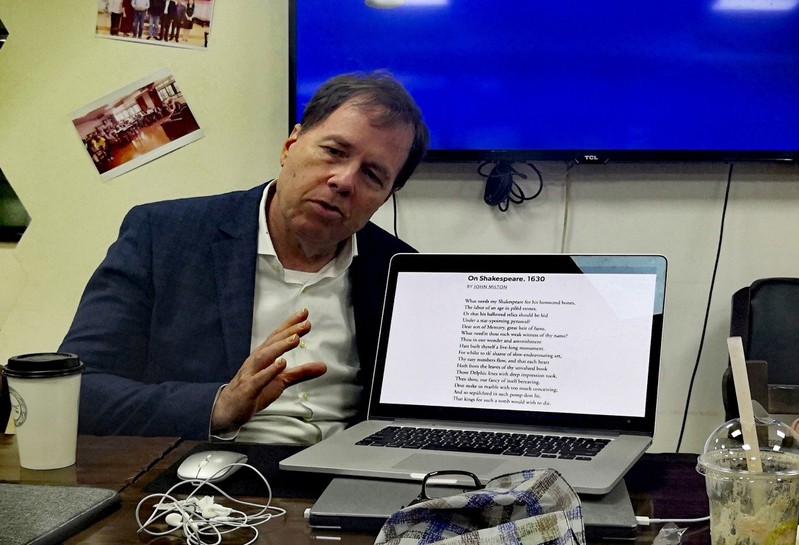On the afternoon of April 21, 2019, Professor Richard Burt from Department of English and Media, University of Florida, USA, gave a lecture entitled “Posthumous Shakespeare: The Metaphysics of Publication” at Room 102, Building East 5, Zijingang Campus. Though it is rainy outside, the Qinghe Cafe was warm with students eager for academic studies. The lecture was organized by the Center for Medieval and Renaissance Studies of School (CMRS) of School of International Studies, and presided over by Prof. Hao Tianhu, Director of the Center, with more than ten teachers and students of School of International Studies present.

At the beginning, Prof. Richard Burt conducted an empirical analysis with rich and detailed evidence, showing the posthumous publication of Shakespeare’s works. In different versions of the folio, the mourning elegiac poetry about Shakespeare could be said as a feast for eyes. In an illustrated presentation to the audience, the professor showed the preambles of Shakespeare’s works, including tributes to Shakespeare by William Wordsworth and other famous poets, among whom, an anonymous poem that has been passed down to the present was later confirmed as Milton’s On Shakespeare.
On this basis, Prof. Richard Burt emphasized the importance of the original edition by comparing Milton’s poems in the original publication with On Shakespeare, a modern English one. He proposed that we often regard one version as classic, reading and studying it, but ignoring the differences between different versions. Even for the same work of Shakespeare, there will be differences among many publications. For example, a word of the prince in Hamlet may have different expressions in different versions, and the expressions in Henry V are different from those in modern English. For published works in Shakespeare’s times, it is often the case that words or phrases were often rearranged by shuffling their order, and the translation of Shakespeare’s plays into modern English was also a loss of the original text.
Therefore, the question raised by Prof. Richard Burt is worth pondering. Are we reading Shakespeare or Shakespeare’s ghost? Due to the differences in versions, he argued, we cannot just read and analyze a particular version, like the scholars of the mid-1990s did, and turn a blind eye to Shakespeare’s publishing history. Differences in versions should not be the sole concern of proofreaders, but of all researchers in the field. We need to keep looking back, not just content with the ideal text.
Then, Prof. Richard Burt showed a new way of studying and spreading Shakespeare in the new age. Scholars can express their views and have academic exchanges not only in journals and books, but also on Twitter. For example, in one news report, Shakespeare’s “Battle of Twitter”, two professors had a heated debate on the version of King Lear on Twitter, which broke through the traditional approach of literary criticism and created a new platform for academic debate. Prof. Richard Burt also cited other examples, such as the use of videos by French scholars to show traces of hand-written marking and modification in earlier versions of Montaigne. On the new technology of literary research, Prof. Hao Tianhu and Prof. Burt discussed the reliability of paper and electronic documents.
Prof. Richard Burt aims to highlight the ethical issue of how we edit, understand and adapt Shakespeare today. Through intensive text reading, he guided the audience to experience an in-depth comparison of the different forms of the word “enough” in Henry V between its ancient version and its version of modern English, thus pointing us to the clues of different versions comprehensively, rather than being confined to a certain consensus or tradition.

Finally, the lecture also touched upon the film adaptation of Shakespeare’s plays. Prof. Richard Burt compared the speech clips from two film versions of Henry V, the 1944 Laurence Olivier version and the 1989 Kenneth Branagh version. He pointed out the differences between Olivier, who spoke to the public in an orderly musical tone, and Branagh, who had a poor pronunciation and intonation, which were inseparable from the political environment and ideology during the Second World War. The professor also pointed out the modern technique used in the 1989 version of the film. Specifically, the contrasting angles of elevation and depression clearly indicated arrogant and domineering leaders and humble and inhuman soldiers. Moreover, the gradually magnifying lens on the face of the protagonist marked differently from the panoramic lens in the 1944 edition. Prof. Hao Tianhu commented in a humorous way that the protagonist in 1989 edition, like Satan, the King of Hell in Paradise Lost, looked down on all living beings from a high throne, which also inspires us to adopt the right method and attitude when appreciating or adapting Shakespeare’s films.
At the end of the lecture, the professor had lively Q & A with the students and teachers present in terms of version difference and film adaptation, etc. His lecture on Shakespeare, with novel and rich contents, enlightening new ideas and new methods in a variety of ways, benefited the attendees a lot. The lecture ended with warm applause.
Center for Medieval and Renaissance Studies of School (CMRS)
at School of International Studies, Zhejiang University
April 25, 2019
Written by Meng Shiying
Photos by Meng Shiying
Translated by Zhan Bingbing
Edited by Xu Xueying



